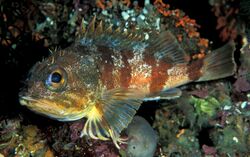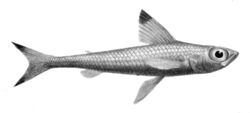Biology:Microcotyle neozealanica
| Microcotyle neozealanica | |
|---|---|
| Scientific classification | |
| Domain: | Eukaryota |
| Kingdom: | Animalia |
| Phylum: | Platyhelminthes |
| Class: | Monogenea |
| Order: | Mazocraeidea |
| Family: | Microcotylidae |
| Genus: | Microcotyle |
| Species: | M. neozealanica
|
| Binomial name | |
| Microcotyle neozealanica Dillon & Hargis, 1965
| |
| Synonyms | |
Microcotyle neozealanica is a species of monogenean, parasitic on the gills of a marine fish. It belongs to the family Microcotylidae.[1]
Taxonomy
Microcotyle neozealanica was first described by Dillon & Hargis in 1965 as Microcotyle neozealanicus.[1] Caballero y Caballero and Bravo-Hollis erected the genus Paramicrocotyle to describe Paramicrocotyle tampicensis and Paramicrocotyle atriobursata off Mexico, and placed within this genus 16 species previously assigned to the genus Microcotyle[3] including Microcotyle neozealanica.[2] However, Microcotyle neozealanica was returned to the genus Microcotyle and Paramicrocotyle is considered a junior subjective synonym of Microcotyle.[4] Microcotyle neozealanica was redescribed by Dillon et al., in 1985 from a single specimen from the gills of Chloropthalmus nigripinnis. The authors stated that additional specimens from this host were needed to verify this record.[5] According to the World Register of Marine Species neozealanicus is a malformed suffix. The current accepted name is Microcotyle neozealanica.[6]
Morphology
Microcotyle neozealanica has the general morphology of all species of Microcotyle, with an elongate fusiform body provided with a thin and smooth tegument, and comprising an anterior body proper which contains most organs and a posterior part called the haptor. The haptor is symmetrical, not well delineated from body proper, and bears 24–29 pairs of clamps. These clamps are similar in shape, but dissimilar in size. The clamps of the haptor attach the animal to the gill of the fish. There are also two biloculate buccal suckers placed ventrolaterally in the buccal cavity. The digestive organs include an anterior, terminal mouth, a muscular pharynx, and a posterior intestine with two lateral branches provided with medial and lateral ramifications. Each adult contains male and female reproductive organs. The reproductive organs include an anterior genital atrium armed with numerous spines, a dorsal vagina, a single tubular and folded ovary, and a number of follicular testes which are postovarian, and 11–20 in number. The fusiform egg has filaments at both ends.[1]
Etymology
The specific epithet neozealanica refers to New Zealand, the type-locality of this species.[1]
Hosts and localities
The type-host of Microcotyle neozealanica is the red gurnard perch Helicolenus percoides (Sebastidae). The type-locality is New Zealand.[1] It was also recorded from Chlorophthalmus nigripinnis (currently named Paraulopus nigripinnis[7]) (Chlorophthalmidae) off Australia .[5]
References
- ↑ 1.0 1.1 1.2 1.3 1.4 1.5 Dillon, W. A., & Hargis, W. J. (1965). Monogenetic trematodes from the southern Pacific Ocean. 2. Polyopisthocotyleids from New Zealand fishes: the families Discocotylidae, Microcotylidae, Axinidae and Gastrocotylidae. Antarctic Research Series, 5, 251–280.
- ↑ 2.0 2.1 Caballero y Caballero, E., & Bravo-Hollis, M. (1972). Monogenea (van Beneden, 1858) Carus, 1863 de peces marinos del litoral Mexicano del Golfo de Mexico y del Mar Caribe.V. Revista de Biología Tropical, 20, 151–165. [1]

- ↑ Mendoza-Franco, Edgar F.; Rosado Tun, Mariela del Carmen; Duarte Anchevida, Allan de Jesús; del Rio Rodríguez, Rodolfo E. (2018). "Morphological and molecular (28S rRNA) data of monogeneans (Platyhelminthes) infecting the gill lamellae of marine fishes in the Campeche Bank, southwest Gulf of Mexico". ZooKeys (783): 125–161. doi:10.3897/zookeys.783.26218. ISSN 1313-2970. PMID 30275730.
- ↑ Mamaev, Y. L. (1986). The taxonomical composition of the family Microcotylidae Taschenberg, 1879 (Monogenea). Folia Parasitologica, 33, 199–206. [2]

- ↑ 5.0 5.1 Dillon, W. A., Hargis Jr, W. J., & Harrises, A. E. (1985). Monogeneans from the southern Pacific Ocean: Polyopisthocotyleids from the Australian fishes, the subfamily Microcotylinae.https://scholarworks.wm.edu/cgi/viewcontent.cgi?referer=https://www.google.fr/&httpsredir=1&article=1026&context=reports.pdf

- ↑ WoRMS (2018). Microcotyle neozealanica Dillon & Hargis, 1965. Accessed at: http://www.marinespecies.org/aphia.php?p=taxdetails&id=1264851 on 2019-01-02
- ↑ Froese, R. and D. Pauly. Editors. (2018). FishBase. Chlorophthalmus nigripinnis Günther, 1878. Accessed through: World Register of Marine Species at: http://www.marinespecies.org/aphia.php?p=taxdetails&id=299930 on 2019-01-03
Wikidata ☰ {{{from}}} entry
 |



